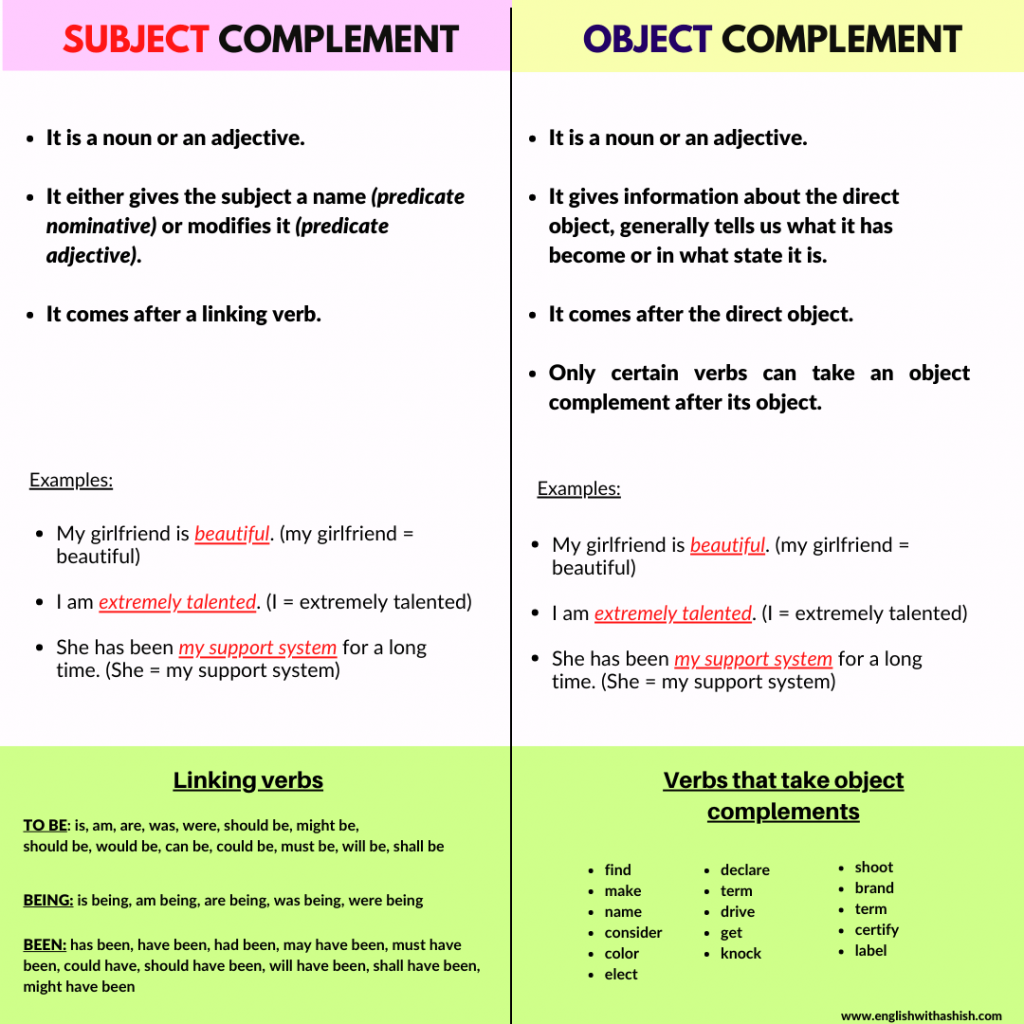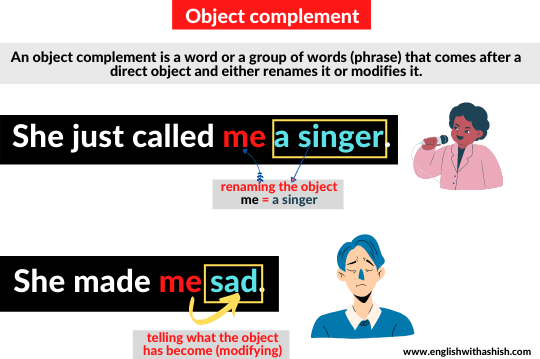Some students get confused between the subject and the object complement, thinking they are the same thing.
A complement in English is a word or words that complete the meaning of a word. There are two types of complements in English:
- Subject complement
- Object complement
In this post, we learn the difference between the subject complement and the object complement. Let’s study what a subject complement and an object complement are.
A subject complement identifies the subject and gives information about it: it either renames the subject or describes it. A noun as the subject complement renames a subject (predicate nominative), and an adjective as a subject complement describes the subject.
On the other hand, an object complement gives information about the direct object. It tells us what the object has become now. It either gives a name to the direct object or talks about its state by describing it.
Examples of subject complements
- Monu is my best friend.
(My best friend, which is a noun phrase, is functioning as the subject complement as it’s giving a new name to the subject Monu.)
- She has been my support system for a long time. (She = my support system)
- Growing up, Sachin Tendulkar was my idol. (Sachin Tendulkar = my idol)
- Amanda Nunes is the best female fighter on this planet. (Amanda Nunes = the best female fighter on the planet)
- My girlfriend is beautiful. (my girlfriend = beautiful)
- I am extremely talented. (I = extremely talented)
Examples of object complements
- The company just made Ron our team leader.
(In this sentence, ‘our team leader’ is the object complement (noun phrase) that’s renaming the object ‘him’. Ron = our team leader )
- Nobody considers him a singer. (him = singer)
- We will name her Amayra. (her = Amayra)
- I found his room very messy. (him room = messy)
- They found us dead. (us = dead)
An infographic that explains the difference between the subject complement and the object complement:

How to identify a subject complement?
A subject complement comes after a linking verb, and it’s either a noun or an adjective. A linking verb links the subject to its complement.
A list of common linking verbs
| TO BE | TO BE: is, am, are, was, were, should be, might be, should be, would be, can be, could be, must be, will be, shall be, BEING: is being, am being, are being, was being, were being BEEN: has been, have been, had been, may have been, must have been, could have, should have been, will have been, shall have been, might have been |
| TO SEEM | seem, seems, seemed |
| TO LOOK | look, looks, looked |
| TO FEEL | feel, feels, felt |
| TO SOUND | sound, sounds, sounded |
| TO TASTE | taste, tastes, tasted |
| TO SMELL | smell, smells, smelt |
| TO STAY | stay, stays, stayed |
| TO BECOME | become, becomes, became |
| TO GO | go, goes, went, gone |
| TO REMAIN | remain, remains, remained |
| TO TURN | turn, turns, turned |
| TO GET | get, gets, got |
| TO APPEAR | appear, appears, appeared |
If a subject is followed by any of these linking verbs, you must have a subject complement after the linking verb. And we already know that the subject complement is either a noun that renames the subject or an adjective that describes the subject. In a nutshell, it gives information about the subject and completes its meaning.
Examples:
- He could have been your coach, but it didn’t happen because of your crazy antics.
- Jane will be an amazing mother.
- Jon stayed composed when the bear attacked.
- Her voice sounds soothing to the ears.
- The test appears difficult for most students.
Check if the subject complement is identifying the subject or not. It won’t do anything else in a sentence.
Note: a subject complement can be a phrase or a clause.
- You are who I can die for. (noun clause)
- You are extremely smart. (adjective phrase)

How to identify an object complement?
The very first thing to note about an object complement is that it comes right after the direct object. Secondly, it gives a name to the object or tells us the state of the object (using an adjective).
Unlike a subject complement, an object complement is not followed by a linking verb. It takes certain action verbs.
A list of verbs that take object complements
- find
- make
- name
- consider
- color
- elect
- declare
- term
- drive
- get
- knock
- shoot
- brand
- term
- certify
- label
All action verbs in English can’t take an object complement. These are the most common verbs that take an object complement.
Examples:
- Jon knocked him unconscious.
- The police shot him dead.
- It’s unfair to label him incapable without looking at his capabilities.
- The news channels have branded him a traitor already.
- The students termed me the best English teacher.
Steps to check if these sentences have object complements in them:
- Check if the sentence has any of the above-mentioned verbs.
- Check if the verb has an object after it.
- Check if the object has a noun or an adjective after it.
If all the three criterias are met, it’s confirmed that the sentence has an object complement.
Observe that the above sentences meet the criterion set. This is a very process-based way to find out the object complement. In reality, you don’t have to do that. Just check the word or words coming after the direct object and ask yourself if the word or words are completing the meaning of the object: giving it a name or talking about its new state.

Difference between the subject complement and the object complement
| Subject complement | Object complement |
| It comes after a linking verb. | It comes after the direct object. |
| It completes the meaning of the subject. | Only certain action verbs take an object complement. |
| It either gives a name to the subject or describes it. | It completes the meaning of the direct object. |
| It is a noun or an adjective. | It is a noun or an adjective. |
Feel free to correct any typing mistakes you come across. Contact me at [email protected] for one-on-one classes.